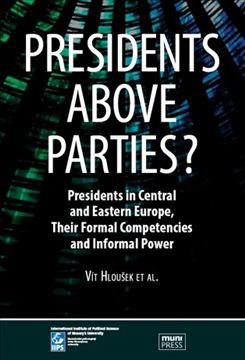Zaradené v kategóriách: POLITOLOGICKÁ LITERATURA, Úvody, přehledy a teorie, Učebnice a skripta, Evropská a světová politika, JINDE NEKOUPÍTE, SPOLEČENSKÁ LITERATURA
Presidents above Parties?
Hloušek Vít
Dostupnosť
skladem
Vydavateľ
Počet stran
311
Místo vydání
Praha
Rok vydání
2014
Formát
A5
ISBN
978-80-2106-687-8
EAN
9788021066878
Více než dvacet let zkušeností s demokratickým vládnutím umožňuje vnímat většinu zemí střední a východní Evropy jako stabilní demokracie, které už nečelí problémům spjatým s post-komunistickou tranzicí, ale novým výzvám pramenícím z aktuálních politických problémů. Současná ekonomická krize v jistém slova smyslu problematizuje tradiční postavení různých politických aktérů a potenciálně může vést k další personalizaci politiky. K méně analyzovaným aspektům těchto procesů patří postavení prezidenta v jiných než prezidentských politických systémech. Může existovat určitá diskrepance mezi formálním a reálným postavením hlav států v zemích střední a východní Evropy, které patří buď k typu parlamentní demokracie, nebo směřovaly či směřují k typu semipresidencialismu. Ať již jsou v těchto zemích voleny hlavy státu přímo nebo prostřednictvím parlamentu, je jejich ústavní postavení založené spíše na výkonu symbolických funkcí a výkonu některých dalších (například nominačních) funkcí ve spolupráci s vládou, která představuje ten v praxi mocnější nástroj exekutivní moci. Kromě litery ústavy jsou to i historicky vytvořené ústavní zvyklosti a osobní charisma či moc jednotlivých presidentů, které dotvářejí reálný vliv hlav států v daných politických systémech. V praxi se setkáváme se snahou některých výrazných politických osobností překročit meze dané literou ústavy a ingerovat do politického procesu výrazným způsobem. Cílem předkládané knihy je zmapovat na příkladu vybraných středoevropských a východoevropských zemí, zda se po roce 1989 objevily tendence či nikoliv k většímu zapojení či osobnímu angažmá presidentů v každodenní politice, co bylo jejich příčinou, jak se projevovaly a zda je můžeme vysvětlit spíše osobností presidenta, nebo strukturou politických příležitostí, která nabídla prezidentovi větší prostor pro osobní politickou realizaci. V případě zemí, kde se takové tendence k „překračování“ ústavních limitů či posilování personálního politického vlivu neprojevily, se snažíme odpovědět na otázku, proč tomu tak je. In last two decades, most countries of Central and Eastern Europe have witnessed an ongoing development of democratic governance, and have thereby acquired a status of stable democracies. They no more face problems connected with post-communist transition and the challenges they have to deal with arise rather from present political situation. Current economic crisis challenges the traditional position of various political actors and may lead to further personalisation of politics. This development can be observed also in a shifting position of president in other than presidential political systems – a phenomenon that has not been sufficiently analyzed yet. There may be a certain discrepancy between formal and actual position of presidents in Central and East European countries, which are classified as parliamentary democracies or systems that have features of semi-presidentialism. The constitutions usually endow presidents – regardless of the way of their selection either through direct or indirect election – with symbolic functions and duties shared with government (such as appointment of important officials). Governments are thus typically perceived as dominant executive institutions. The influence of presidents in selected political systems is given not only by the letter of the constitution but also by historically rooted constitutional traditions or personal charisma and power of concrete presidents. We can observe how certain strong political personalities overstep their constitutionally defined powers and interfere significantly in the political process. The aim of the forthcoming book is to find out whether we can trace an increasing engagement of presidents in everyday politics in selected CEE countries. If so, the authors will try to find out, what the causes of their increasing engagement are, how it is manifested and whether it is caused by the president’s personality or rather by a changing structure of political opportunities that provides presidents with room to manoeuvre. In case of countries where we do not prove the presence of tendencies to “overstep” constitutionally given powers or to enhance presidential political influence we will try to find out why it is so.
-
Položka byla přidána do košíku.




